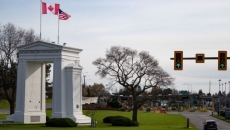Canadians are stressed out about the economy and have little faith in politicians or governments to fix big problems, a new survey suggests.
The annual CanTrust Index published by Proof Strategies queries Canadians about their level in trust in everything from political leaders and businesses to corporations, the media, bankers and scientists.
The 2024 edition shows that fear of economic pain, such as a recession or unemployment, appears to be driving higher levels of anxiety than COVID-19 ever did.
"We were surprised to see how high the anxiety has gone," said Proof chair Bruce MacLellan. "Two-thirds of Canadians say they currently are feeling anxiety and stress."
Women in particular reported higher levels of economic anxiety and lower levels of confidence in the health care system and in Canada's democracy than did their male counterparts.
Almost three in four women surveyed said the economy had increased their anxiety and stress levels compared with fewer than three in five men who took part in the poll.
"If people don't feel like they're getting a fair deal, if people are feeling like they're not advancing or getting ahead or taking care of their families, they start to lose trust," said MacLellan.
He cited in particular the "values question," which asks respondents to rate a list of core values that represent Canada.
"With women, every single one of them has dropped and their confidence that Canada is living up to its values is in decline."
The poll also suggests the faith of Canadians in the country's political leaders to ease those fears is still plumbing new depths, said MacLellan.
"I think the biggest problem areas are the behaviour of politicians and how they are not contributing or building trust."
Trust in Prime Minister Justin Trudeau has plummeted in the last 12 months, he added: where 36 per cent of respondents believed he would do right by Canadians a year ago, only 25 per cent do now.
Last month Finance Minister Chrystia Freeland cited anxiety about the cost of living and housing when asked why her government was faring so poorly in opinion polls of late.
Opposition leaders didn't fare much better: public confidence in them registered only slightly higher than it did for Trudeau. About 32 per cent said they trusted Conservative Leader Pierre Poilievre or NDP Leader Jagmeet Singh to do the right thing.
Overall, faith in politicians was at a paltry 17 per cent, something MacLellan said should be a wake-up call to those vying for votes.
Fewer than one in four people surveyed felt that any level of government — federal, provincial or municipal — would be able to solve the affordable housing crisis.
Only one in three said they believed Canada would meet its national climate targets, while just under half of respondents said they trusted the federal government to respond to a natural disaster.
At the provincial level, 47 per cent said they trusted provinces to deliver education, and 44 per cent trusted provinces on public health.
There were some glimmers of hope for a handful of institutions or organizations.
In the 2023 survey, only 30 per cent of respondents said they had faith in Hockey Canada, a few months after the national sporting body saw its entire board of directors resign amid investigations of their handling of sexual misconduct allegations against players.
This year, trust in Hockey Canada jumped to 41 per cent.
The news media, too, fared better, said MacLellan. Some 56 per cent of respondents said they trust traditional media to provide reliable information, with 49 per cent saying the same of journalists.
That is still well back of trust in doctors (78 per cent), scientists (74 per cent) and teachers (68 per cent), but well ahead of bankers (40 per cent) and religious leaders (30 per cent).
"These are brutal times for trust," MacLellan said.
"Polarized politics, economic stress, just deliberate disinformation — and yet it's encouraging when we see trust in the news media holding, and growing trust in experts, like scientists and doctors."
The trust index surveyed 1,501 Canadian adults online between Jan. 3 and Jan. 13. Online surveys cannot be assigned a margin of error because they do not randomly sample the population.






